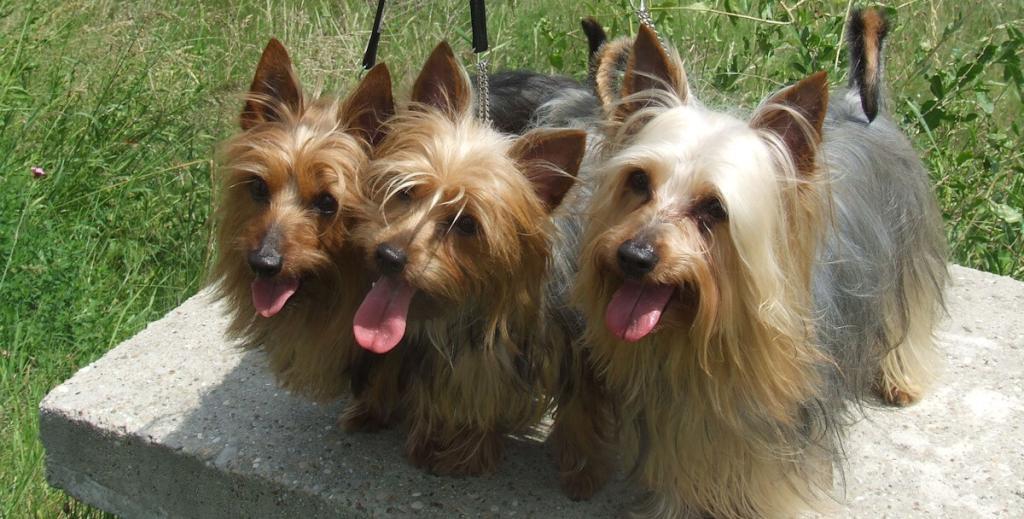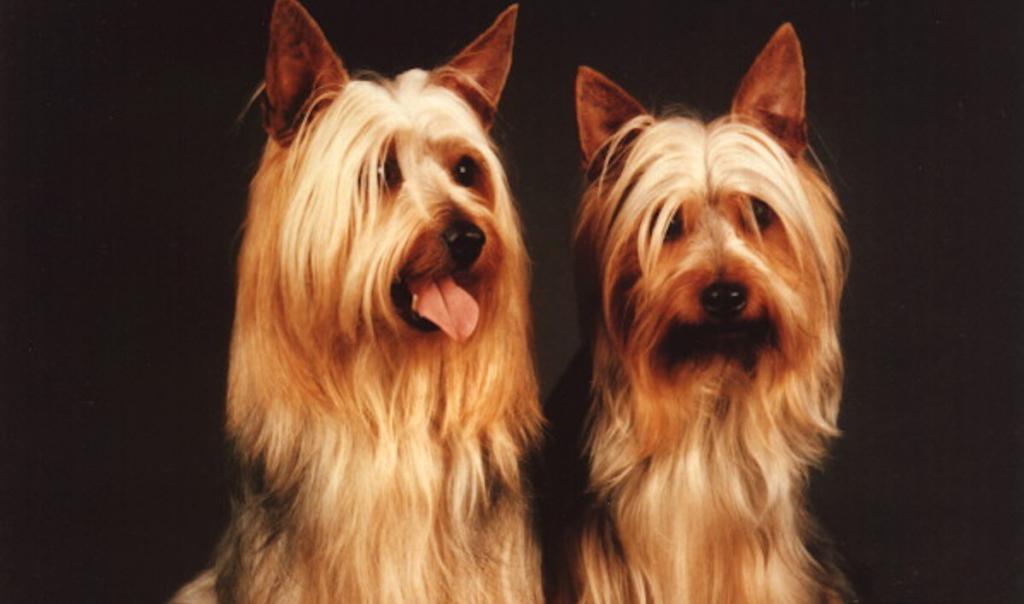As you navigate the bustling dog park of breeds, the Silky Terrier stands out like a well-tailored suit in a sea of off-the-rack jackets; its sleek coat and keen eyes reflect understated elegance.
Compact and brimming with confidence, this Australian Toy Terrier exudes a charisma that belies its small stature. You’ll find that the Silky Terrier’s temperament is a tapestry of tenacity, affection, and intelligence, making it both a delightful companion and a spirited playmate.
But don’t let their luxurious locks deceive you; these dogs are more than just a pretty face. They require a particular kind of care and thrive under certain conditions. Considering whether this breed aligns with your lifestyle, ponder the nuances that make the Silky Terrier an enthralling addition to the right home.
Will their vibrant personality and care requirements weave seamlessly into the fabric of your daily life? Let’s explore the threads that make up the rich pattern of the Silky Terrier’s character and needs.
- Noise Level
- Energy
- Sociability
- Trainability
- Care
- Health
Overall
Summary
The Silky Terrier is rated moderately for noise level, energy, sociability, trainability, care needs, and health, making it a balanced and manageable companion for many households.
Silky Terrier: Traits, Temperament, and Care Guide
Why choose a Silky Terrier as your next canine companion? This breed’s dynamic traits and lively temperament demand a close look if you seek a small, energetic, and affectionate pet with a strong hunting heritage.
As an Australian silky terrier owner, you’ll cherish their tough character, perfectly complementing an active lifestyle that values playfulness and companionship.
Their athletic build, reflecting their history of hunting small vermin, adds to their charm. Despite their small size, they pack a spirited small breed temperament, always ready for adventure.
You must commit to regular coat care to maintain their luxurious blue and tan coat. With daily exercise needs of 30-60 minutes, a Silky Terrier offers enduring friendship.
Exploring the Characteristics of the Silky Terrier
Delving into the characteristics of the Silky Terrier reveals a breed that’s both diminutive in size and robust in spirit, offering a unique blend of athleticism and companionability for the discerning dog owner. This toy terrier possesses a heritage rich in purpose. It was originally bred in Australia to hunt small vermin. Now, let’s examine some specific traits and temperament details of the Silky Terrier in the table below:
| Aspect | Description | Note |
|---|---|---|
| Size & Build | Weight: 9-11 lbs, Height: 9 inches at the withers | Athletic, slightly longer than tall |
| Exercise Requirements | 30-60 minutes daily | Energetic, requires substantial activity |
| Social Traits | Playful and loving, may show aggression to dogs | Good with children, varies with pets |
| Lifespan & Coat | 12-15 years, long, straight, silky blue & tan | Requires regular grooming |
These details help you understand the Silky Terrier’s energetic nature and social predispositions, thus ensuring you’re well-equipped to join the community of Silky Terrier enthusiasts.
Silky Terrier: A Comprehensive Profile and Guide
You’re about to thoroughly understand the Australian Toy Terrier, a breed with origins in the late 19th century, formed by the crossbreeding of Yorkshire and Australian Terriers.
This breed’s compatibility with children and potential for aggressiveness towards other dogs requires careful socialization and training.
With their need for daily exercise and mental engagement, you’ll find that despite their adaptability to apartment living, they demand an active lifestyle to prevent behavioral issues.
Everything You Need to Know
For those considering the companionship of a Silky Terrier, understanding this breed’s distinctive traits and care requirements is essential for a harmonious relationship. The Australian Silky Terrier is a small, spirited companion with a striking coat and an endearing temperament.
To nurture a deep bond and ensure their well-being, take note of the following:
- Coat Care: Their luxurious silky coats require regular grooming to prevent tangles and maintain a glossy appearance.
- Exercise Needs: Daily 30-60 minutes of daily activity keeps them physically fit and mentally stimulated.
- Temperament: Known for their intelligence and affection, they’re great with considerate children and adapt well to apartment living.
- Health Considerations: Watch for common health issues and provide a balanced diet to support their energetic lifestyle.

Discovering the Temperament
Why might the Australian Toy Terrier, with its combination of intelligence, courage, and alertness, be the ideal watchdog for your home?
These friendly dogs aren’t just affectionate companions and embody the classic terrier temperament: spunky, cheerful, and friendly.
They possess a natural vigilance that, coupled with their affectionate nature, makes them fit seamlessly into the family dynamic, offering companionship and protection.
The Australian Toy Terrier thrives on interaction and craves attention, ensuring a solid bond and a sense of belonging within your household.
Their energy and curiosity require regular exercise to channel their spirited disposition positively.
Be aware, these inquisitive canines are keen diggers and may exhibit their robustness in your garden.
Despite their sturdy build, watch for common health concerns like intervertebral disc disease and patellar luxation.
Silky Terrier: Is It a Good Fit for Families?
You might wonder if an Australian Toy Terrier is the right addition to your family dynamic.
With their intelligent and loyal nature, they’re inclined to bond well with children and other pets, but you’ll need to commit to their exercise needs and grooming routine.
Their adaptability to apartment living also makes them a viable option for families residing in smaller spaces.
Assessing Silky Terrier’s Compatibility with Families and Kids
Considering a Silky Terrier as your next family pet? It’s important to weigh their compatibility with children and other household animals to ensure they integrate smoothly into your home dynamic. Here’s what you should consider:
- Good with children: Silky Terriers bond well with older kids who handle them gently. Their small size makes them less suitable for young children who may play too rough.
- Other pets: This breed may show aggression toward other dogs, requiring careful introduction and supervision.
- Energy and space: Despite their small size, they’re energetic and can live happily in apartments if given enough exercise.
- Training and socialization: Essential for a well-behaved pet, consistent training helps mitigate excessive barking and ensures they fit in well with your family.
Silky Terrier Adjustability
When adapting to new environments, the Silky Terrier often showcases remarkable versatility, which makes them well-suited to various living situations. As a descendant of the Australian Terrier, this small dog breed inherits a robust constitution that helps them thrive in diverse households. Their adjustability extends to both apartment living and spacious homes, provided they’ve ample opportunity for mental and physical stimulation.
However, it’s essential to consider their tendency to bark, an attribute that can be managed with consistent training. Analyzing their behavior, the Silky Terrier’s vocal reactions are often a response to unfamiliar stimuli or a display of their alert nature.

Silky Terrier Obedience Tips
When training your Silky Terrier, it’s crucial to employ positive reinforcement; this breed responds well to rewards and consistent commands.
Their sharp intelligence and desire to please mean they can quickly pick up on obedience cues, provided you’re patient and persistent.
Ensure they’re well-exercised and socialized to enhance their focus during training. This reduces the likelihood of distractions and behavioral issues.
Effective Training Strategies
Effective training for your Silky Terrier hinges on understanding its intelligent yet sometimes stubborn nature and employing consistent, positive reinforcement techniques to shape its behavior. You must recognize its exercise needs to prevent boredom and promote good behavior. Daily walks are not just a way to meet these needs but also prime opportunities for obedience training.
To engage you further, here’s a detailed table outlining effective training strategies:
| Strategy | Description | Benefit |
|---|---|---|
| Positive Reinforcement | Rewarding good behavior with treats or praise | Encourages repetition of desired actions |
| Consistency | Same commands and rules at all times | Prevents confusion and ensures reliability |
| Exercise Integration | Incorporating training into daily walks | Fulfills energy needs and reinforces training |
Utilize these strategies to develop a strong bond and ensure your Silky Terrier becomes a well-behaved companion.
Exercise and Grooming Needs
To ensure your Australian Toy Terrier remains physically fit and mentally sharp, incorporate a blend of walking, playtime, and mental challenges into their daily exercise.
As a breed that thrives on engagement, your Silky Terrier needs daily activities that stimulate their agile minds and provide an outlet for their energy.
Beyond physical activity, grooming is vital. Their luxurious coat needs daily brushing to prevent tangles and matting. A comb to work through the fine hair at least twice a week is essential to maintain that Silky sheen.
Regular professional grooming every 6-8 weeks ensures their coat stays in top condition. And don’t forget, a bath monthly will keep your companion looking and feeling their best.
Health Considerations
As you consider bringing an Australian Toy Terrier into your home, it’s crucial to understand their common health issues and anticipated lifespan.
These terriers often face conditions like Legg-Calve-Perthes Disease and Tracheal Collapse, which can significantly impact their quality of life.
Proactive health monitoring and veterinary care are key to managing these conditions and can contribute to a lifespan.
Common Health Issues and Lifespan
When considering the health of Australian Silky Terriers, it’s important to note that they’re susceptible to conditions such as Legg-Calve-Perthes Disease and Patellar Luxation, which can impact their overall well-being and lifespan. These health issues require attentive care and often, intervention from a veterinarian.
Patellar luxation, for instance, involves the dislocation of the kneecap, which can lead to discomfort and mobility challenges. A less common but serious condition is a portosystemic shunt, where blood circulation bypasses the liver, leading to significant health problems.
With a life expectancy of 12-15 years, your Silky Terrier’s longevity largely depends on genetics, care, and early detection of such health issues. Regular exercise, professional grooming, and a high-quality diet are crucial in maintaining their health and ensuring they remain part of your family for many years.
Is Silky Terrier the Right Dog for You?
Considering an Australian Silky Terrier as your next canine companion requires assessing whether their high-energy temperament and grooming needs align with your lifestyle. This toy dog breed thrives on daily exercise, so you must commit to 30-60 minutes of activity to keep them happy. They’re adaptable enough for apartment living, provided you meet their energy needs.
The Silky Terrier’s temperament is bold and adventurous, suited for someone who enjoys a lively and affectionate pet. Regular grooming is non-negotiable due to their luxurious coat, which demands brushing and washing to prevent tangles and maintain health.
Alternatives for Silky Terrier: Playful and Lively Small
Breeds
Explore these breeds if you appreciate the Silky Terrier’s playfulness and liveliness, perfect for those who enjoy spirited and cheerful small dogs.
| Similar Dogs | Short Description |
|---|---|
| Yorkshire Terrier | A tiny breed with a big personality, ideal for companionship and city living. |
| Australian Terrier | A small, sturdy breed known for its confidence and spirited nature. |
| Cairn Terrier | Energetic and adventurous, ideal for active owners and families. |
| Norfolk Terrier | A small and sturdy breed, known for its outgoing and playful temperament. |
| Toy Fox Terrier | A tiny breed with a big personality, energetic and loyal. |
Conclusion
So, you’re considering a Silky Terrier? Brace yourself for a pint-sized dynamo. These Aussie marvels will keep you on your toes with their high-octane antics and coiffure that demands more upkeep than a celebrity’s.
Perfect for those who fancy a living, barking, fur-swathed challenge—couch potatoes need not apply.
Train with patience, and remember that despite their Lilliputian stature, they’re terriers at heart, with egos to match their luxurious locks.
Ready for the whirlwind?
